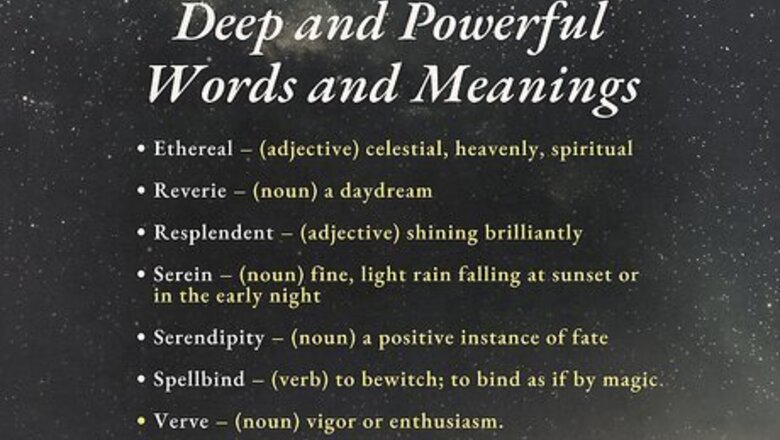
views
Deep and Powerful Words and Meanings
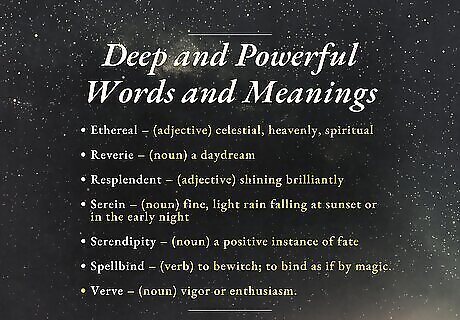
Sprinkle some of these inspiring and meaningful words into your vocab. The words on this list are uncommon and aesthetically pleasing, but they all mean something profound, fascinating, and even empowering. Ethereal – (adjective) celestial, heavenly, spiritual Gossamer – (noun) cobwebs floating in air; also, something generally light or delicate Petrichor – (noun) the pleasant, earthy smell that accompanies or follows rainfall on soil or rocks Reverie – (noun) a daydream Resplendent – (adjective) shining brilliantly Saudade – (noun) a feeling of melancholy, nostalgia, or longing (Portuguese) Schadenfreude – (noun) enjoyment gleaned from witnessing others in trouble Serein – (noun) fine, light rain falling at sunset or in the early night Serendipity – (noun) a positive instance of fate Spellbind – (verb) to bewitch; to bind as if by magic Transcendent – (adjective) surpassing the limits of ordinary experience; also, surpassing the universe of material existence Verve – (noun) vigor or enthusiasm Virtuoso – (noun) a person with special knowledge or skills in a certain field Wanderlust – (noun) strong longing for or impulse toward wandering Wuthering – (adjective) pertaining to wind blowing with a dull roaring noise Ylem – (noun) a primordial gas consisting of neutrons, from which it is theorized the elements were formed Zeitgeist – (noun) the intellectual, cultural, and moral climate of an era Meet the wikiHow Experts Adrian Lin is an American accent coach with a BA in Linguistics & Communication. He focused on phonology, phonetics, and dialectology and was a founding member of the Penn Linguistics Society. Katherine Demby is a test prep specialist and academic consultant who specializes in tutoring for the LSAT, GRE, SAT, ACT, and academic subjects for high school and college students.
Beautiful Words and Meanings
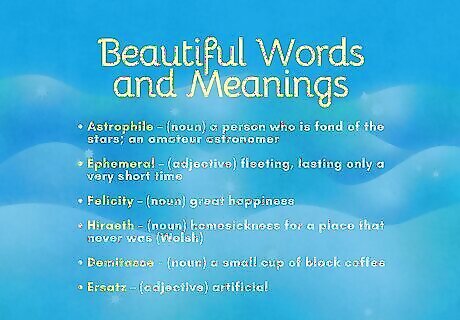
Incorporate these aesthetic-sounding words into your everyday lexicon. Did you know Lord of the Rings author J. R. R. Tolkien was a well-respected linguist? He invented the term phonaesthetics, which refers to the study of the aesthetics associated with the sounds of certain words, regardless of the words' meanings. These words are truly beautiful-sounding, even if their meanings are ho-hum (or even negative): Astrophile – (noun) a person who is fond of the stars; an amateur astronomer Ephemeral – (adjective) fleeting, lasting only a very short time Felicity – (noun) great happiness Hiraeth – (noun) homesickness for a place that never was (Welsh) Calliope – (noun) the Greek Muse of heroic poetry; also a keyboard musical instrument resembling an organ Convivial – (adjective) relating to, occupied with, or fond of feasting, drinking, and good company Cornucopia – (noun) a curved, hollow goat's horn or horn-shaped container (especially a basket) overflowing with goods, especially fruit and vegetables Demitasse – (noun) a small cup of black coffee Derecho – (noun) a great, fast-moving complex of thunderstorms that cause widespread destruction Elixir – (noun) a cure-all; also a sweetened liquid used for medicinal or flavoring purposes; also a substance that can change base metals into gold Ersatz – (adjective) artificial Frangipani – (noun) any of a genus (Plumeria) of shrubs or small trees of the dogbane family that are native to the American tropics and widely cultivated as ornamentals
Unusual Words and Meanings
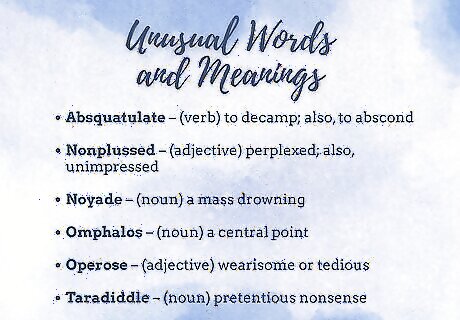
These words are unique and one-of-a-kind. From abomasum to spitchcock, there's nothing like a weird-sounding word to spice up the conversation! Sprinkle some of these truly unusual terms throughout your vocab to impress everyone around you: Abomasum – (noun) the fourth compartment of the ruminant stomach that follows the omasum and has a true digestive function Absquatulate – (verb) to decamp; also, to abscond Limerence – (noun) the intoxicating early phase of love, marked by intense euphoria, intrusive thoughts, mood swings, and infatuation Nonplussed – (adjective) perplexed; also, unimpressed Noyade – (noun) a mass drowning Ogdoad – (noun) in Gnosticism, a group of eight divine beings or of eight aeons (that is, Gnostic angels) Omphalos – (noun) a central point Operose – (adjective) wearisome or tedious Periphrasis – (noun) the use of a longer, more convoluted phrasing in lieu of a shorter, more efficient phrasing Rickrack – (noun) a flat braid woven to form zigzags and used especially as trimming on clothing Scrofulous – (adjective) appearing diseased or rundown; also, of, pertaining to, or infected with scrofula (a type of tuberculosis) Snollygoster – (noun) a shrewd and unscrupulous person Sobriquet – (noun) a descriptive name or epithet; a nickname Sockdolager – (noun) something that is exceptional; also, a decisive blow or answer that settles a matter Spitchcock – (noun) an eel that has been split and grilled Taradiddle – (noun) pretentious nonsense
Rare Words and Meanings
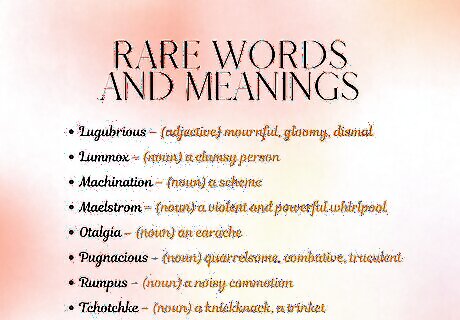
Add some of these uncommon words to your vocab. Instead of happy, try describing your mood as halcyon. Instead of knickknack, refer to your treasures as tchotchkes. Adding these rare words to your vocab is a simple way to make your everyday conversations more interesting: Halcyon – (adjective) idyllic; happy; often used to describe an ideal time from the past; also (noun) a type of legendary bird, associated with the kingfisher Juxtaposition – (noun) two things placed side by side to compare or contrast, or to create a compelling effect Lugubrious – (adjective) mournful, gloomy, dismal Lummox – (noun) a clumsy person Machination – (noun) a scheme Murmuration – (noun) a low utterance of continuous sounds; also, a flock of starlings Maelstrom – (noun) a violent and powerful whirlpool Orrery – (noun) an apparatus showing the relative positions and motions of bodies in the solar system by balls moved by a clockwork Otalgia – (noun) an earache Pugnacious – (noun) quarrelsome, combative, truculent Quibble – (verb) to evade an argument by quarreling unnecessarily about words; to bicker Rumpus – (noun) a noisy commotion Syzygy – (noun) the nearly straight-line configuration of three celestial bodies (such as the sun, moon, and earth during a solar or lunar eclipse) in a gravitational system Tchotchke – (noun) a knickknack, a trinket
Cool Words and Meanings
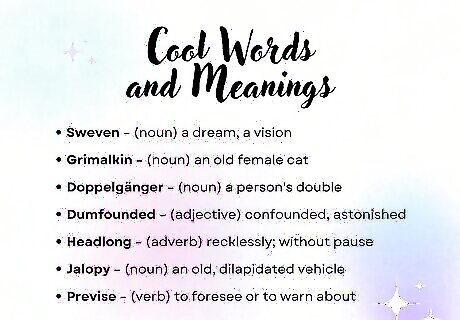
These words are just super neat-sounding. Saying them won't just make you sound smarter, it'll make you sound way cooler than you actually are (or maybe more pretentious? You'll have to give it a whirl and tell us how it goes): Sweven – (noun) a dream, a vision Grimalkin – (noun) an old female cat Cryptozoology – (noun) the search for and study of legendary animals (for instance, Big Foot) Diphthong – (noun) in linguistics, a gliding monosyllabic speech sound (such as the vowel combination at the end of toy) that starts at or near the articulatory position for one vowel and moves to or toward the position of another Doppelgänger – (noun) a person's double Dumbfounded – (adjective) confounded, astonished Glabella – (noun) the smooth bone between the eyebrows Haphazard – (adjective) characterized by a lack of order or direction Headlong – (adverb) recklessly; without pause Interrobang – (noun) a punctuation mark that combines an exclamation point with a question mark, used at the end of an exclamatory (often rhetorical) question: ‽ Jabberwocky – (noun) meaningless writing or speech, originating from the poem "Jabberwocky" by Lewis Carroll, which referred to a made-up nonsensical monster Jalopy – (noun) an old, dilapidated vehicle Pilgarlic – (noun) a bald head or a bald-headed man; a man looked at with humorous contempt or mock-pity Previse – (verb) to foresee or to warn about
Funny Words and Meanings
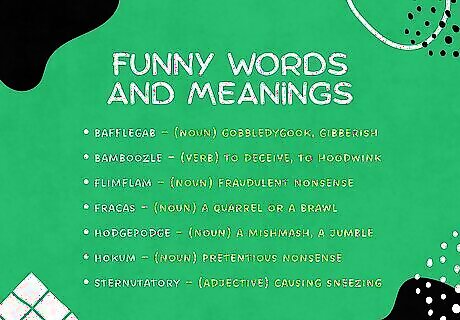
These words are easy to memorize because they're so goofy. Why say "Oh my gosh" when you could say "Gadzooks!"? Some words just beg to be used, and these silly-sounding words are on that list: Bafflegab – (noun) gobbledygook, gibberish Bamboozle – (verb) to deceive, to hoodwink Finagle – (verb) to obtain by trickery or by indirect means Festoon – (noun) a decorative chain; also (verb) to hang a decorative chain Flimflam – (noun) fraudulent nonsense Flummery – (noun) a soft porridge or jelly made using flour or meal; a type of sweet dessert Foofaraw – (noun) frills, flashiness; also, a to-do or a fuss over something trivial Fracas – (noun) a quarrel or a brawl Fuddy-duddy – (noun) an old-fashioned, uptight, conservative, or unimaginative person Gadzooks – (exclamation) a mild oath, similar to "egads" or "fiddlesticks" Haboob – (noun) an intense dust storm formed by strong winds that occurs in arid and semi-arid regions Hodgepodge – (noun) a mishmash, a jumble Hokum – (noun) pretentious nonsense Ragamuffin – (noun) a ragged, disreputable-looking person Skullduggery – (noun) deceptive or underhanded behavior; a devious trick Sternutatory – (adjective) causing sneezing
Short Deep Words and Meanings
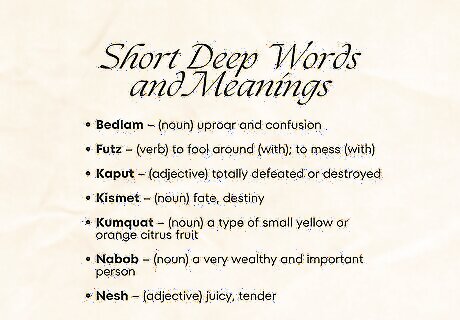
Spice up your everyday vocab with these unusual but easy-to-say words. It was kismet that you landed on this article, because we've got just the words to add to your vocab! At two syllables or fewer, these terms will be fairly simple to remember: Bedlam – (noun) uproar and confusion Bugbear – (noun) an imaginary specter or goblin; also, a source of dread or irritation Doldrums – (noun) a period of listlessness and despondency; stagnation; a slump Guru – (noun) a personal spiritual guide or religious teacher, primarily in Hinduism; also a guide or expert generally Fez – (noun) a brimless cylindrical hat with a flat top that has a tassel, worn especially by men in eastern Mediterranean nations Futz – (verb) to fool around (with); to mess (with) Heyday – (noun) the period of one's greatest popularity, vigor, or prosperity Kaput – (adjective) totally defeated or destroyed Kismet – (noun) fate, destiny Kumquat – (noun) a type of small yellow or orange citrus fruit Kvetch – (verb) to complain, to gripe; also (noun) someone who complains or gripes Lampoon – (noun) a harsh satire; also (verb) to make the subject of a satire Nabob – (noun) a very wealthy and important person Nesh – (adjective) weak and delicate, in particular in being susceptible to the cold. Sylvan – (noun) someone who spends time in the woods; also (adjective) of or pertaining to woods
Long Deep Words and Meanings
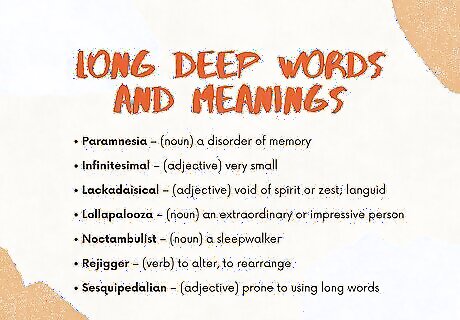
Try saying one of these words 5 times fast! Stop your friends in their tracks by dropping a truly impressive and long word in the middle of your convo. These multi-syllabic terms are absolutely scrumpdiddlyumptious and sure to turn you into a sesquipedalian: Metensomatosis – (noun) the migration into one body of different souls Oneirataxia – (noun) the inability to distinguish between dreams and reality Paramnesia – (noun) a disorder of memory Metempsychosis – (noun) the passing of the soul at death into another body either human or animal Infinitesimal – (adjective) very small Antimacassar – (noun) a cover that protects the back or arms of furniture Lackadaisical – (adjective) void of spirit or zest; languid Lollapalooza – (noun) an extraordinary or impressive person Noctambulist – (noun) a sleepwalker Rejigger – (verb) to alter, to rearrange Sassafras – (noun) an eastern North American tree (Sassafras albidum) of the laurel family having both ovate and lobed aromatic leaves; also the dried root bark of the plant used as a flavoring agent Scrumdiddlyumptious – (adjective) extremely delicious, originating from Roald Dahl's book Charlie and the Chocolate Factory Sesquipedalian – (adjective) prone to using long words
Interesting Words According to an Expert
These words are Lin's favorites. He explains some of the most beautiful, unusual, and impressive words in the English language: Awful – (adjective) very unpleasant. This is a weird word because it “used to mean 'inspiring awe' and had a good meaning,” says Lin. But, “over time, it started to have a negative meaning.” Bus – (noun) a large vehicle that carries passengers. Lin says, “I believe the word ‘bus’ is impressive because of how much it has changed over time.” The word is “a shortening of ‘omnibus’ which itself is a shortening of ‘motor omnibus’ or ‘voiture omnibus.’” He explains that “‘Omni’ is a Latin prefix for ‘all,’” and in the early 1800s, there were lots of different omnibuses, like horse omnibuses and car omnibuses. Lin adds that bus is virtually the same in most European languages (bus or autobus) and even sounds similar in Mandarin (bāshì) and Japanese (basu). Certain – (adjective) to know for sure. Lin says, “This word is interesting because in an American accent, this word can be argued to have no vowels: [srt.n].” He explains that certain is a syllabic nasal, which means the second syllable is just the /n/ sound. This happens in other words, like mountain and tighten. Defenestrate – (verb) to throw out of a window. Lin says, “The weirdness of this word is the specificity of it.” He explains that it “consists of the prefix ‘de-’ meaning ‘from,’ the root ‘fenestr’ from Latin ‘fenestra’ meaning ‘window,’ and the suffix ‘-ate’ which…turns something into a verb.” Extraterritoriality – (noun) exemption from the jurisdiction of local law. Lin says this word is beautiful “because it has 4 stresses.” You say it like, “EXtraTErriTOriAlity.” He explains that “stressed syllables are longer in duration and typically higher in pitch,” in English, which gives the word “a sort of bouncy elastic feeling.” Hábitat – (noun). According to Lin, “the Spanish word for ‘habitat’ is pretty weird.” He says, “Spanish words typically have plural forms ending in a vowel + s” (like canal > canales). But, “this word’s official plural is ‘hábitats’ without any vowel before the s.” Lin says, “This is the only word I know so far that ends in two consonants.” Manufacture – (verb) to make something with machinery. Lin says this is another weird word that used to mean the opposite of its current definition. “Manufacture comes from Latin ‘manu-’ meaning 'hand' and 'factor' meaning 'to make.’” So, “the word originally meant ‘to make by hand.’” Mesmerize – (verb) to hypnotize, to transfix. Lin explains that “this verb doesn’t come from Latin, but instead comes from the name of Franz Anton Mesmer.” He says Mesmer was “a physician whose theory of Mesmerism suggested one could use a mysterious force to hypnotize patients.” Eventually, people started using his name to mean “to hypnotize” or “to fascinate.” Sixths – (noun) six equal parts of something. Lin says, “This word is actually pretty hard to say because of the final consonant cluster /sɪksθs/, and I like that and think it’s beautiful.” He explains, “I personally like complex sound sequences, but many people may actually find simple sound sequences more beautiful,” such as the phrase cellar door, which was made popular by J. R. R. Tolkien. Taikonaut – (noun). Lin explains that “this is a rare niche word that refers to a Chinese astronaut, typically indicating s/he’s from the Chinese Space program.” It’s unusual because “it anglicizes the Chinese word ‘太空’ (tàikōng), meaning space, and adds it to the Greek -naut suffix that we use for ‘Astronaut.”
What makes words beautiful?
Sound and meaning can make a word seem more beautiful. According to Lin, “beautiful” words often have a simple syllable structure (consonant, vowel, consonant) and melodic sound. This is a common feature in languages like Italian and Japanese, which lots of people agree are beautiful and have a sing-songy quality. Lin also believes the meaning of the word plays a part. “If a word has a beautiful meaning,” he says, “then you might find it beautiful.” For example, Lin says cellar door, which is famously regarded as one of most beautiful sounding phrases, follows a simple consonant and vowel sequence. He goes on to say that saudade is widely regarded as a beautiful word due to its poignant, melancholic meaning. On the other hand, he says a word like moist can “evoke a viscerally negative emotion due to what is associated with it.” Languages that have more consonant clusters, like German, often sound less melodic, says Lin, so people may find them less pleasant-sounding. At the end of the day, though, Lin says what makes a word beautiful is entirely subjective.
How to Enrich Your Vocabulary
Read. A lot. The more you come upon a certain word in context, the more likely it is to stick in your mind. Read books that incorporate more challenging language to exercise your brain. If possible, use context clues to try to figure out what a new word means before jumping to the dictionary to look it up.
Link a new word to something you're already familiar with. It's easier to learn a new word if it's connected to something you already know or are interested in. If you don't have a specific list of vocabulary words to learn and want to generally improve your vocab, consider starting with words that are connected to your interests and hobbies. For instance, if you're a musician, the word arpeggio would be a great word to add to your vocabulary because it's a music term (it refers to the tones of a chord played in succession, either ascending or descending). If you have to learn pre-designated words (such as for the SATs), try linking them to something you already know, even if the connections are tenuous or crazy. For instance, you might remember the word sylvan because it sounds like Sylvia, which is the name of your friend who loves hiking in the woods (sylvan means "of or pertaining to woods").
Look into the etymology of new words. Understanding the roots of strange new words will make it easier to remember them, according to Demby. "Whenever you come across an unfamiliar word, look up the etymology of that word," she advises. "Then look at other words that share the same root words. Associating unfamiliar words with known words that share the same root can be a great way to build vocabulary." "For instance, knowing that the root word mater- or matri- comes from the Latin word mater, meaning mother, can help you understand the definitions of words like matron, maternity, matricide, matrimony, and matriarchal," Demby adds. "Many words that share the same root words have related meanings."
Keep a vocabulary journal. Record words you want to add to your vocabulary in a dedicated journal, including its definition, part of speech, and, perhaps, its etymology and an example of the word in a sentence. And be sure to handwrite it: writing helps us more deeply encode information we want to retain because there's a direct link between our hands and our brain. Visualizing and speaking can also help you retain the meaning of a new word, so when you record a new term in your journal, say it and its meaning out loud. When you're trying to recall the word later, try visualizing it written in your journal.















Comments
0 comment